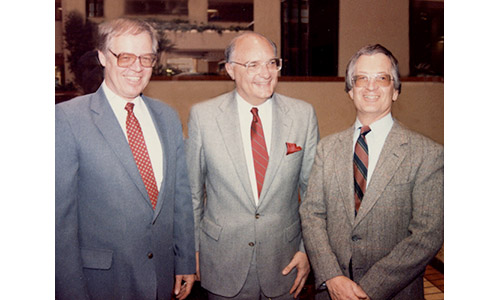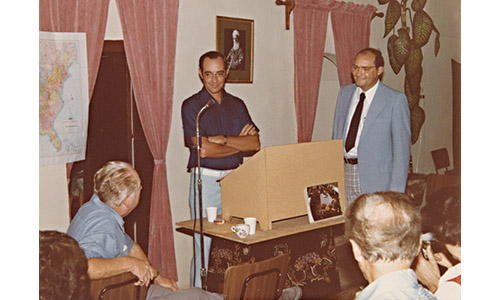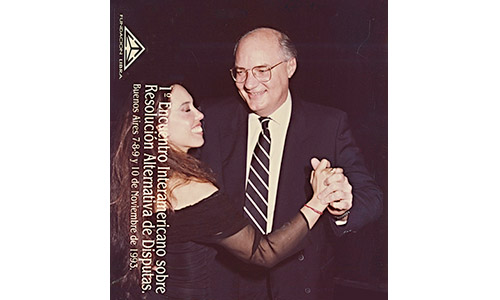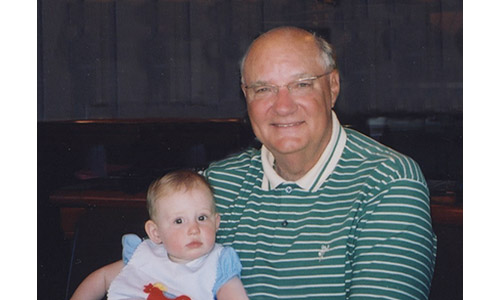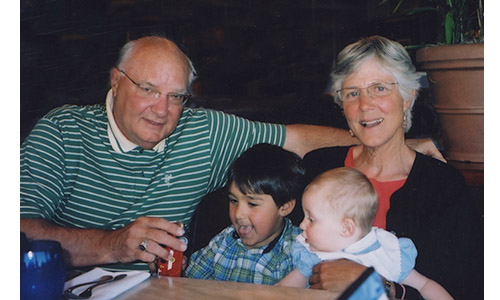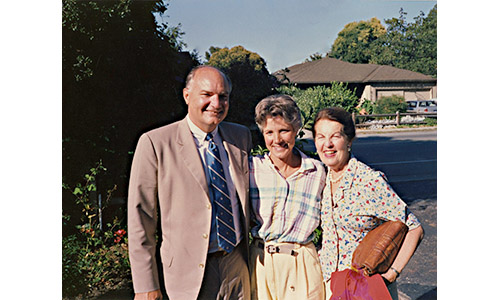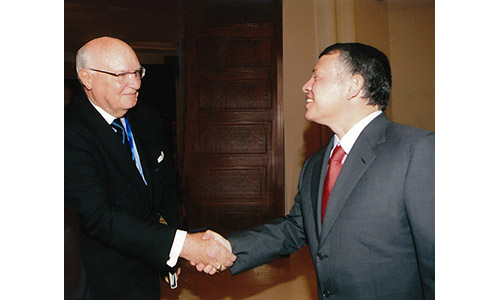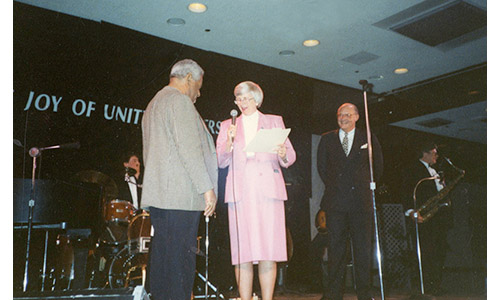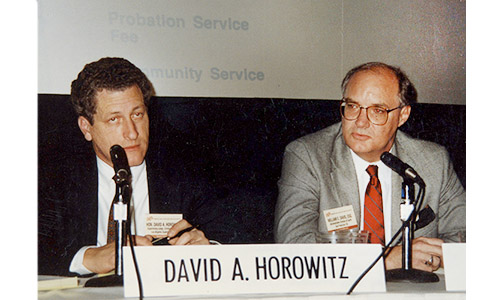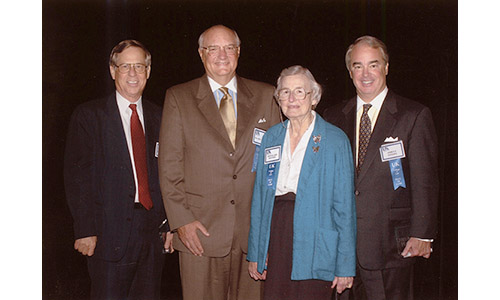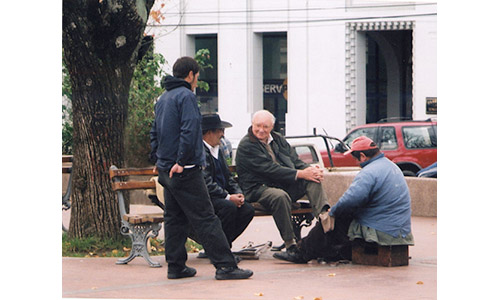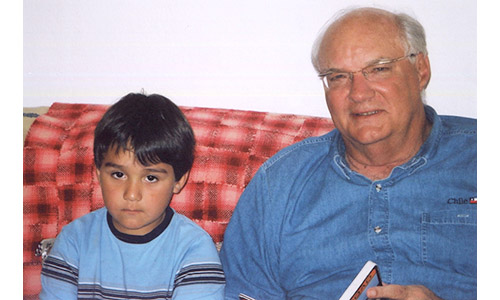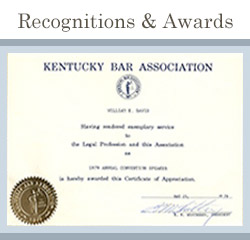Bill's New Book! In Service to Justice
Link to Book
An account of a life framed by family, faith, and service, In Service to Justice is a part spiritual and part adventure story. Following Bill from the hills of eastern Kentucky, one man goes on a quest to improve justice in Kentucky, California, Latin America, and the Middle East. With each page, we are forced to look inward and reflect on our own virtues and how we stack up compared to others.
The following photo was taken at the San Francisco Talk with speakers Malcolm Feeley, Shahla Ali, and Bill Davis, on July 22, 2024.
The following photo was taken at the San Francisco Talk with speakers Malcolm Feeley, Shahla Ali, and Bill Davis, on July 22, 2024.
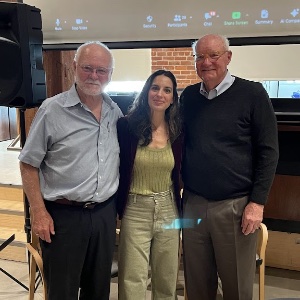
-----------------------------------
Bill's career has covered 45 years working in the field of justice at the state, federal and international level.
He began working at the ~California Judicial Council in the early 1970’s under the tutelage of Ralph Kleps. During this period he led several noteworthy studies on the language needs of non English speaking people with the judicial system,created the state judicial planning committee. He then took charge of the direction of the judicial reform effort in his home state of Kentucky. An effort that led to the comprehensive restructuring of the trial and appellate courts, abolishing bail bondsmen, and creating the first statewide pretrial release organization in the U.S.
From there he was invited to serve at the Baha'i World Center in Haifa, Israel. He returned to the U.S. to assume duties as Circuit Executive for the federal courts in the Ninth Circuit covering 14 Western States and Pacific Territories. He was appointed by the Judicial Council of California to be Administrative Director of the Courts of California. During his tenure California undertook the largest successful civil trial delay reduction project in the U.S.
In addition, he oversaw the completion of major studies on gender and race bias in the justice system. In 1992 he cofounded a consulting firm, DPK Consulting, to work internationally on justice reforms around the globe. DPK has been recognized as a foremost rule of law firm through it’s projects in over 50 countries.
Bill served as a member of the National Spiritual Assembly of the Baha'i’s of the United States for 23 years.
He has received numerous recognitions for his work, Hall of Fame at the University of Kentucky College of Law, the Henry R. Heyburn Alumni Public Service Award from the University of Kentucky College of Law, Distinguished Public Service Award from Transylvania University, Council of State Governments award for one of 10 most significant new state programs in the U.S for creation of pretrial release program to mention a few. Bill has been recognized internationally for his dedication, passion, and expertise in justice and conflict resolution issues and, of course for his prowess as a scratch golfer.
He began working at the ~California Judicial Council in the early 1970’s under the tutelage of Ralph Kleps. During this period he led several noteworthy studies on the language needs of non English speaking people with the judicial system,created the state judicial planning committee. He then took charge of the direction of the judicial reform effort in his home state of Kentucky. An effort that led to the comprehensive restructuring of the trial and appellate courts, abolishing bail bondsmen, and creating the first statewide pretrial release organization in the U.S.
From there he was invited to serve at the Baha'i World Center in Haifa, Israel. He returned to the U.S. to assume duties as Circuit Executive for the federal courts in the Ninth Circuit covering 14 Western States and Pacific Territories. He was appointed by the Judicial Council of California to be Administrative Director of the Courts of California. During his tenure California undertook the largest successful civil trial delay reduction project in the U.S.
In addition, he oversaw the completion of major studies on gender and race bias in the justice system. In 1992 he cofounded a consulting firm, DPK Consulting, to work internationally on justice reforms around the globe. DPK has been recognized as a foremost rule of law firm through it’s projects in over 50 countries.
Bill served as a member of the National Spiritual Assembly of the Baha'i’s of the United States for 23 years.
He has received numerous recognitions for his work, Hall of Fame at the University of Kentucky College of Law, the Henry R. Heyburn Alumni Public Service Award from the University of Kentucky College of Law, Distinguished Public Service Award from Transylvania University, Council of State Governments award for one of 10 most significant new state programs in the U.S for creation of pretrial release program to mention a few. Bill has been recognized internationally for his dedication, passion, and expertise in justice and conflict resolution issues and, of course for his prowess as a scratch golfer.
Download PDF
Book Review!
Davis, a longtime civil servant, reflects on his life in this memoir.
In his nonfiction debut, the author tells his own story from his childhood in Hazard, Kentucky, to his Christian upbringing, his time in the Peace Corps, his marriage, his completion of law school, and his introduction both to the California Judicial Council and to a lifelong career in judicial administration. In each section of his book, he includes a chapter outlining the ongoing development of his Baha’i faith, starting with his conversion in 1974 only weeks after reading The Book of Certitude by Baha’u’llah and initially being struck by one of its central assertions: “It is not for him to pride himself who loveth his own country, but rather for him who loveth the whole world. The earth is but one country and mankind its citizens.” Time and again in his work with various judicial systems all over the world, he felt the truth of this assertion: “My international experiences have taught me that we live in an integrated world, a world where we are connected at many levels,” he writes. Readers follow his career as it takes him from a position as director of the administration of courts in California to head of a consulting firm undertaking missions in Pakistan, Jordan, Latin America, and elsewhere, where he was continually learning about the judicial, political, and cultural challenges of each country.
Thanks to the sheer breadth of Davis’ experiences in his career, readers are taken into many different cultures and legal systems, in which the author notes differences and similarities. In Pakistan, for instance, Davis noticed that, at a gathering, some lower court and High Court judges would barely greet one another because they were from different tribes. When he watched judges in Jordan, while advising the Judicial Council, he also saw a lack of collegiality: “Judges usually exhibit a degree of stiffness and reticence when they sit in a room with one another,” he recalls. “I can see the hidden pecking order, latent hostilities, constant jockeying for position, extreme caution by some, and a degree of solemnity.” But the main strength of his book is its unwavering humanity and decency. In every chapter, regardless of the adventure he’s having, Davis is always a quiet, observant, and respectful presence. His optimistic view of humanity permeates every page, particularly when he’s confronting the inertia or indifference of the official world, where the reflexive stance is often “if it ain’t broke, don’t fix it”; he expresses a clear belief that it’s possible to make any institution better. He helpfully distills much of the wisdom he’s accumulated in the “On Reflection” sections. When summarizing the characteristics that reflect institutional integrity in an organizational culture, for instance, he lists, “A management style that encourages participation, flexibility, teamwork, problem solving, and equity,” and a “sense of mission for employees.” However, the author’s overarching philosophy makes the strongest impression, rather than individual bits of wisdom.
An appealingly humble and direct account of the adventures of a judicial bridge-builder.
EXCERPTING POLICIES
Please review Kirkus Media’s excerpting policies before publishing any portion of this review online or in print for any use. To learn about proper attribution and to ensure your use is in compliance with our guidelines, we invite you to visit:
In his nonfiction debut, the author tells his own story from his childhood in Hazard, Kentucky, to his Christian upbringing, his time in the Peace Corps, his marriage, his completion of law school, and his introduction both to the California Judicial Council and to a lifelong career in judicial administration. In each section of his book, he includes a chapter outlining the ongoing development of his Baha’i faith, starting with his conversion in 1974 only weeks after reading The Book of Certitude by Baha’u’llah and initially being struck by one of its central assertions: “It is not for him to pride himself who loveth his own country, but rather for him who loveth the whole world. The earth is but one country and mankind its citizens.” Time and again in his work with various judicial systems all over the world, he felt the truth of this assertion: “My international experiences have taught me that we live in an integrated world, a world where we are connected at many levels,” he writes. Readers follow his career as it takes him from a position as director of the administration of courts in California to head of a consulting firm undertaking missions in Pakistan, Jordan, Latin America, and elsewhere, where he was continually learning about the judicial, political, and cultural challenges of each country.
Thanks to the sheer breadth of Davis’ experiences in his career, readers are taken into many different cultures and legal systems, in which the author notes differences and similarities. In Pakistan, for instance, Davis noticed that, at a gathering, some lower court and High Court judges would barely greet one another because they were from different tribes. When he watched judges in Jordan, while advising the Judicial Council, he also saw a lack of collegiality: “Judges usually exhibit a degree of stiffness and reticence when they sit in a room with one another,” he recalls. “I can see the hidden pecking order, latent hostilities, constant jockeying for position, extreme caution by some, and a degree of solemnity.” But the main strength of his book is its unwavering humanity and decency. In every chapter, regardless of the adventure he’s having, Davis is always a quiet, observant, and respectful presence. His optimistic view of humanity permeates every page, particularly when he’s confronting the inertia or indifference of the official world, where the reflexive stance is often “if it ain’t broke, don’t fix it”; he expresses a clear belief that it’s possible to make any institution better. He helpfully distills much of the wisdom he’s accumulated in the “On Reflection” sections. When summarizing the characteristics that reflect institutional integrity in an organizational culture, for instance, he lists, “A management style that encourages participation, flexibility, teamwork, problem solving, and equity,” and a “sense of mission for employees.” However, the author’s overarching philosophy makes the strongest impression, rather than individual bits of wisdom.
An appealingly humble and direct account of the adventures of a judicial bridge-builder.
EXCERPTING POLICIES
Please review Kirkus Media’s excerpting policies before publishing any portion of this review online or in print for any use. To learn about proper attribution and to ensure your use is in compliance with our guidelines, we invite you to visit:
















